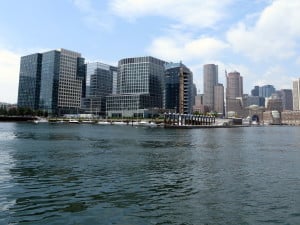
Developers of waterfront projects in Massachusetts would have more leeway to choose ground-floor tenants under proposed changes to the state’s Chapter 91 regulations.
Developers of waterfront projects may soon have an easier time leasing out ground-floor spaces under Chapter 91 rule changes proposed by the state Department of Environmental Protection.
Often stuck with hard-to-fill spaces in some waterfront projects, developers and property owners have long lobbied for relief from the state’s strict Chapter 91 requirements that require ground-floor spaces to be filled with restaurants, shops and other retail venues readily accessible to the public. The requirement for so-called “facilities of public accommodations” (FPAs) has been on the books for decades.
But developers and property owners say not all waterfront locations are created equal. Boston’s Seaport District and other bustling areas, for instance, are suitable for restaurants and retail shops because they have strong foot traffic in those areas.
Yet other areas, such as in East Boston or parts of Beverly or Lynn, aren’t as well-trafficked. The result: high vacancy rates on ground floors.
After years of hearing complaints and reviewing the subject, the DEP earlier this year unveiled a proposed new category for ground-floor lease spaces under Chapter 91: “facilities of limited accommodations” (FLAs), which would allow property owners to fill some ground-floor spaces with child care facilities, law offices, health care facilities (such as dentist and physician offices), and other places that members of the public can access via appointments.
The rule change, which could take effect by the end of this year, has at least one surprise supporter: Boston Harbor NOW, an organization made up of the former Boston Harbor Association and the Boston Harbor Islands Alliance. The two groups, which recently merged, have fought for years to promote and defend public access to waterfront areas.
Julie Wormser, vice president at Boston Harbor NOW, said her group is grudgingly going along with the changes, largely because it’s the lesser of two evils. She said her group still has concerns about introducing so-called “facilities of limited accommodations.”
But the fact is that the ground floors of some waterfront properties are struggling and major eyesores because owners simply can’t fill spaces, Wormser said.
“The worst option is vacant storefronts,” she said.
She described DEP’s proposed rule changes as “reasonable,” though she still worries that the new FLA designation will become a permanent fixture at some buildings and that local economic development agencies will too readily grant exemptions from retail requirements. Under the planned changes, local economic agencies would have to sign off on letting non-retail uses on ground floors, after developers prove they tried and failed to market spaces for retail.
Uneven Demand For Ground-Floor Space
Needless to say, developers and property owners are happy with DEP’s new recommendations.
“It could be a real boon for some coastal communities,” said David Begelfer, the chief executive of NAIOP, a commercial real estate development association. “This has been a long time coming.”
Jamie Fay, president of Fort Point Assoc., a land-use and environmental consulting firm, said that Chapter 91 is a “fundamentally very good” law designed to protect public access to waterfronts. But it needed modifications to make it economically more realistic for some property owners.
He noted that the HarborView at the Navy Yard in Charlestown, which was built last decade, has struggled to fill its ground-floor space with retail tenants.
“The demand (for retail) just isn’t there at the Navy Yard,” he said. “It’s worse for everyone, property owners and residents alike, to have these vacant, empty spaces.”
Other waterfront communities that could benefit from the rule changes include Chelsea, Everett, Lynn, Newburyport and Quincy, he said.
One high-profile project that won’t be affected by the Chapter 91 modifications is the Cronin Group’s proposal to build a 250-foot-tall, 110-unit condo tower at the current site of the Whiskey Priest and Atlantic Beer Garden in Boston’s Seaport District. Though the Cronin Group has proposed ground-floor retail and an expanded Harborwalk at the site, it still needs to clear other Chapter 91 requirements because of the scope of the project on such a small piece of land, officials say.
Ben Lynch, program chief of waterway programs at DEP, said state officials tried to strike a balance between protecting public access to waterfronts and economically helping property owners.
He emphasized that no more than 50 percent of a building’s ground-floor space can be designated as FLAs, while a minimum 25 percent must be maintained for retail space (even if the space can’t be filled) and 25 percent used for lobbies and delivery access points within buildings.
The new ground-floor designations also must be reviewed and re-approved every ten to 15 years, depending on the size of the building, he said.
“We think it’s a fair and balanced solution to a problem,” said Lynch of DEP’s set of recommendations. “What we’ll have in the end are quasi-public spaces, rather than vacant spaces.”







